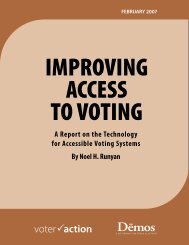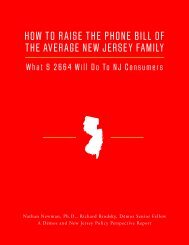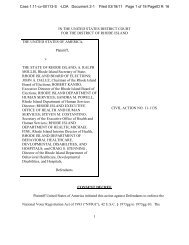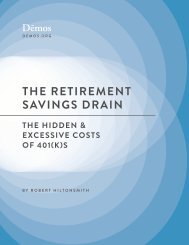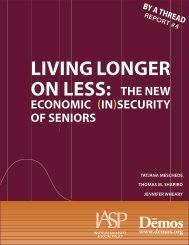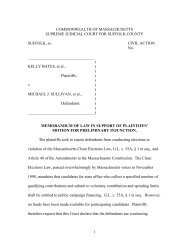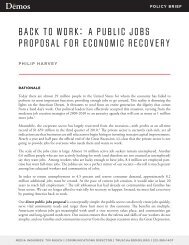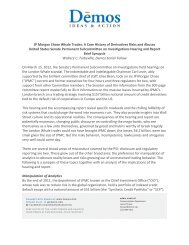Bullies at the Ballot Box - Demos
Bullies at the Ballot Box - Demos
Bullies at the Ballot Box - Demos
Create successful ePaper yourself
Turn your PDF publications into a flip-book with our unique Google optimized e-Paper software.
In June 2012, <strong>the</strong> Department of Justice (DOJ) filed<br />
a lawsuit against <strong>the</strong> St<strong>at</strong>e of Florida and Florida’s<br />
Secretary of St<strong>at</strong>e asserting th<strong>at</strong> Florida is viol<strong>at</strong>ing<br />
federal law with a voter purge. 96 Because of <strong>the</strong> timing<br />
of <strong>the</strong> purge, DOJ asserted th<strong>at</strong> this process viol<strong>at</strong>ed<br />
federal law and th<strong>at</strong> any system<strong>at</strong>ic purging program<br />
within <strong>the</strong> 90-day quiet period before an election for<br />
federal office viol<strong>at</strong>es Section 8 of N<strong>at</strong>ional Voter<br />
Registr<strong>at</strong>ion Act (NVRA). 97 Fur<strong>the</strong>r, <strong>the</strong> DOJ alleged th<strong>at</strong><br />
<strong>the</strong> compiled lists of voters are based on inaccur<strong>at</strong>e<br />
and unreliable d<strong>at</strong>a, in viol<strong>at</strong>ion of Section 8(b)(1) of <strong>the</strong><br />
NVRA, which requires th<strong>at</strong> verific<strong>at</strong>ion procedures be<br />
“uniform, nondiscrimin<strong>at</strong>ory, and in compliance with <strong>the</strong><br />
Voting Rights Act of 1965.” 98 Although <strong>the</strong> court denied<br />
<strong>the</strong> DOJ’s motion for a temporary restraining order in<br />
part because <strong>the</strong> program had been halted, it found th<strong>at</strong><br />
“[t]here were major flaws in <strong>the</strong> program” including <strong>the</strong><br />
Secretary’s compil<strong>at</strong>ion of “<strong>the</strong> list in a manner certain<br />
to include a large number of citizens.” 99 Federal litig<strong>at</strong>ion<br />
is ongoing. Florida has sued <strong>the</strong> federal government for<br />
denying Florida access to its citizen d<strong>at</strong>abase. 100 Voting<br />
rights advoc<strong>at</strong>es, including <strong>the</strong> Advancement Project, Fair<br />
Elections Legal Network, Project Vote, L<strong>at</strong>ino Justice,<br />
ACLU, Mi Familia Vota Educ<strong>at</strong>ion Fund, and <strong>the</strong> Lawyers’<br />
Committee for Civil Rights Under Law have all sued<br />
Florida for viol<strong>at</strong>ing <strong>the</strong> Voting Rights Act. 101<br />
Ultim<strong>at</strong>ely, this is a government-sponsored purge<br />
– a coordin<strong>at</strong>ed effort instig<strong>at</strong>ed by <strong>the</strong> Governor’s<br />
administr<strong>at</strong>ion, r<strong>at</strong>her than by overzealous citizen<br />
activists. But priv<strong>at</strong>e actors may also build lists of<br />
voters based on unreliable d<strong>at</strong>a and challenge voters’<br />
registr<strong>at</strong>ion st<strong>at</strong>us, as <strong>the</strong>re is no law in Florida th<strong>at</strong><br />
explicitly prohibits voter caging. Their actions could be<br />
far more discrete than a st<strong>at</strong>ewide purge and targeted <strong>at</strong><br />
specific counties. These efforts have a gre<strong>at</strong>er chance<br />
of flying under <strong>the</strong> radar, but would still jeopardize <strong>the</strong><br />
voting rights of eligible, registered Americans. Election<br />
administr<strong>at</strong>ion officials must be as cognizant of unreliable<br />
d<strong>at</strong>a used by priv<strong>at</strong>e citizens in challenging voters as <strong>the</strong>y<br />
were in resisting Governor Scott’s st<strong>at</strong>e-sponsored voter<br />
purges. n<br />
any time it deems necessary.” 104 Election officials<br />
are required to investig<strong>at</strong>e challenges to voter<br />
qualific<strong>at</strong>ions if <strong>the</strong> challenges are brought more<br />
than ten days before an election; investig<strong>at</strong>ions<br />
“may” be deferred to after an election if <strong>the</strong>y are<br />
raised within ten days of Election Day. 105 The law<br />
requires election authorities to investig<strong>at</strong>e “m<strong>at</strong>erial<br />
affecting any voter’s qualific<strong>at</strong>ions brought to [<strong>the</strong>ir]<br />
<strong>at</strong>tention from any source.” Importantly, implicit<br />
in <strong>the</strong> st<strong>at</strong>ute is a requirement th<strong>at</strong> challengers must<br />
provide more than mere lists of voters, because<br />
<strong>the</strong> law requires election officials to investig<strong>at</strong>e<br />
“m<strong>at</strong>erial” concerning a voter’s qualific<strong>at</strong>ions<br />
provided by any source. Authorities should consider<br />
streng<strong>the</strong>ning this requirement to something like <strong>the</strong><br />
supporting “documentary evidence” requirement in<br />
Colorado. They should also require hearings before<br />
cancelling registr<strong>at</strong>ions, and require challenges to<br />
be brought in writing, under o<strong>at</strong>h, and based on<br />
personal knowledge of <strong>the</strong> challenger. Missouri<br />
law should make clear th<strong>at</strong> <strong>the</strong> burden of proving<br />
ineligibility lies on <strong>the</strong> challenger, not <strong>the</strong> registered<br />
voter, and <strong>the</strong>re should be penalties for frivolous<br />
challenges. Legisl<strong>at</strong>ion banning <strong>the</strong> practice of using<br />
caging lists to strike voters from <strong>the</strong> registr<strong>at</strong>ion<br />
rolls was introduced in Missouri in 2008 106 and<br />
2009 107 , but did not become law.<br />
nevaDa<br />
Nevada law generally does a good job protecting<br />
registered voters from improper pre-Election Day<br />
challenges. In Nevada, a voter may only challenge<br />
<strong>the</strong> registr<strong>at</strong>ion st<strong>at</strong>us of any o<strong>the</strong>r voter registered<br />
to vote in <strong>the</strong> same precinct. 108 This jurisdictional<br />
requirement of precinct-level commonality<br />
between <strong>the</strong> challenger and <strong>the</strong> challenged voter<br />
is an important safeguard against widespread<br />
voter challenge campaigns th<strong>at</strong> lack precinctlevel<br />
organiz<strong>at</strong>ion. There is also a narrow six-day<br />
window for written challenges to take place before<br />
Election Day. Written challenges must be signed by<br />
<strong>the</strong> challenger, include <strong>the</strong> grounds for challenge,<br />
and must be based on personal knowledge. 109 This<br />
provision could be improved by requiring th<strong>at</strong><br />
challenges be made under o<strong>at</strong>h. Within 5 days<br />
September 2012 | <strong>Bullies</strong> <strong>at</strong> <strong>the</strong> <strong>Ballot</strong> <strong>Box</strong> • 11




